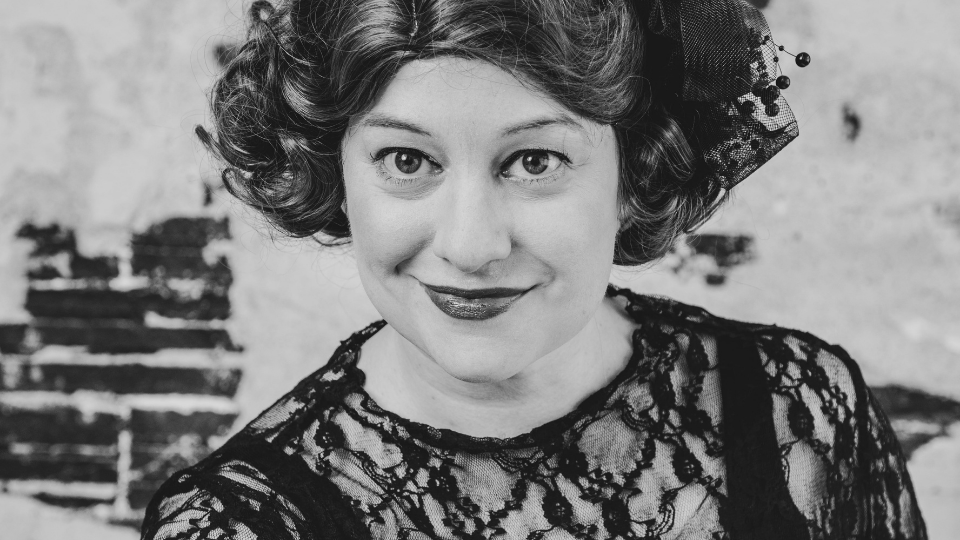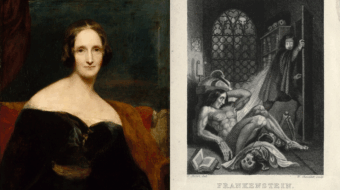
When I heard that Shelley Cooper was presenting a solo show about the great Lotte Lenya, I was excited to learn about and experience a production dramatizing this lefty legend. Rag Doll on a Bomb Site also sounded perfect for the Hollywood Fringe Festival, that freewheeling “annual open-access, community-derived event celebrating freedom of expression and collaboration in the performing arts community” that “is completely open and uncensored” with “Hundreds of productions… mounted in fully equipped theaters, parks, clubs, churches, restaurants” in “the Hollywood neighborhood.”
Lenya was the wife of composer Kurt Weill, the collaborator of librettist/dramatist Bertolt Brecht, likely the Left’s most outstanding playwright ever. Lotte played the prostitute Jenny Diver in the 1928 Brecht/Weill satirical musical The Threepenny Opera, as well as in the 1931 movie adaptation by the renowned German helmer G.W. Pabst (who is the subject of Daniel Kehlmann’s new novel, The Director). It was her co-starring role in The Threepenny Opera at Berlin’s Theater am Schiffbauerdamm that propelled Lenya to stardom.
Cooper, who wrote the one-woman show she performs in, frames Rag Doll on a Bomb Site (if you want to find out why Cooper chose this title you’ll just have to go see the play!) by flashbacking between fragments of Lenya’s troubled early life in Vienna and a disagreement she has with Weill in her dressing room shortly before the curtain is to lift on opening night. After the 50-minute play, Cooper told me that this tete-a-tete actually transpired, which she derived from Lenya’s autobiography. 
Although this play relates some factual details of Lenya’s life, including her abusive childhood, Cooper expresses Lenya’s life largely through dance and songs, which Cooper composed and croons (accompanied by recorded music). We only hear a few strains of the most famous song Lenya was associated with, “Mack the Knife,” which innumerable artists, including Louis Armstrong and Ella Fitzgerald, have covered.
At the Tony awards ceremony on June 8 (the same night Rag Doll opened), the actor who stars in the new musical about Bobby Darin opened his set on the telecast singing Darin’s popular version of “Mack the Knife.” I suspect that Cooper wrote and sang her own numbers rather than songs from Lenya’s rather extensive oeuvre due to copyright considerations (although as of 2024, “Mack the Knife” is now reportedly in the public domain). In any case, a droll line in Rag Doll has some scallywag (probably a reviewer) describing Lenya’s voice as being “an octave below laryngitis.”
Overall, in the ragged Rag Doll, we get a sense of who Lenya was in her childhood and up to her star turn as Jenny Diver in 1928, as opposed to a chronological, fact-based recounting of Lenya’s life. There is little about Brecht and nothing about her future career or politics. Ironically, the screen role the left-leaning Lenya, that Austrian associate of the German radical Brecht and wife of Weill, is best known for in America is as Rosa Klebb, who tried to liquidate James Bond with poisoned blades that chillingly click out of her shoes in the 1963 anti-communist thriller From Russia with Love. In 1956, Lenya won a Tony Award for reprising her role as Jenny (reportedly the only time an Off-Broadway performance has been so honored) in Marc Blitzstein’s English-language version of Threepenny. (If memory serves correctly, in his 2000 biography of Blitzstein, Mark the Music, Eric A. Gordon writes that this composer and playwright of another leftwing classic, 1937’s The Cradle Will Rock, made more money from his translation of Weill and Brecht’s The Threepenny Opera than from any other project Blitzstein ever worked on.)
Lenya was Golden Globes and Academy Award-nominated for playing the pimp Contessa Magda Terribili-Gonzales in the 1961 screen adaptation of Tennessee Williams’ The Roman Spring of Mrs. Stone opposite Vivien Leigh, Warren Beatty and Jill St. John. One could say that Lenya was typecast to play a procurer in Roman Spring because she’d portrayed a prostitute in her very first film.
Rag Doll includes video projections designed by Roger Pavey Jr.—no, not of clips from Lenya’s performances, but like Cooper’s interpretation of her life, the video imagery tends towards the abstract. At less than an hour long, it seems that this one-person show could be expanded to include more basic info about Lenya’s remarkable career and life, as well as her politics. Be that as it may, Shelley Cooper’s evocation of Lenya definitely captures the Hollywood Fringe Festival’s pushing-the-boundaries sensibility.
Rag Doll is for theatergoers who enjoy stage/screen history, Brecht, Weill, solo shows and women-themed productions, although due to sensitive subject matter it is definitely not for children and those triggered by themes of child abuse, rape and prostitution, which, as Cooper proudly shows us, Lotte Lenya not only survived, but triumphed over. She was, to paraphrase Brecht, the mother of courage. If you see this one-woman play, you just might feel like you won the Lotte!
Rag Doll on a Bomb Site is being presented on Wednesday, June 18, at 7:00 p.m. and Saturday, June 21, at 8:30 p.m. at Hudson Guild Theatre, 6539 Santa Monica Blvd., Hollywood, CA 90038. Go here for info, and here for tickets.
Fun fact of the review: Twenty-six years after The Threepenny Opera world-premiered at Theater am Schiffbauerdamm, in 1954 this neo-Baroque venue became the home of the renowned Berliner Ensemble, the theater company Brecht had co-founded, after the playwright—who’d escaped the Nazis and their U.S. counterparts, the House Un-American Activities Committee—fled the so-called “land of the free” and returned to the German Democratic Republic.
We hope you appreciated this article. At People’s World, we believe news and information should be free and accessible to all, but we need your help. Our journalism is free of corporate influence and paywalls because we are totally reader-supported. Only you, our readers and supporters, make this possible. If you enjoy reading People’s World and the stories we bring you, please support our work by donating or becoming a monthly sustainer today. Thank you!










